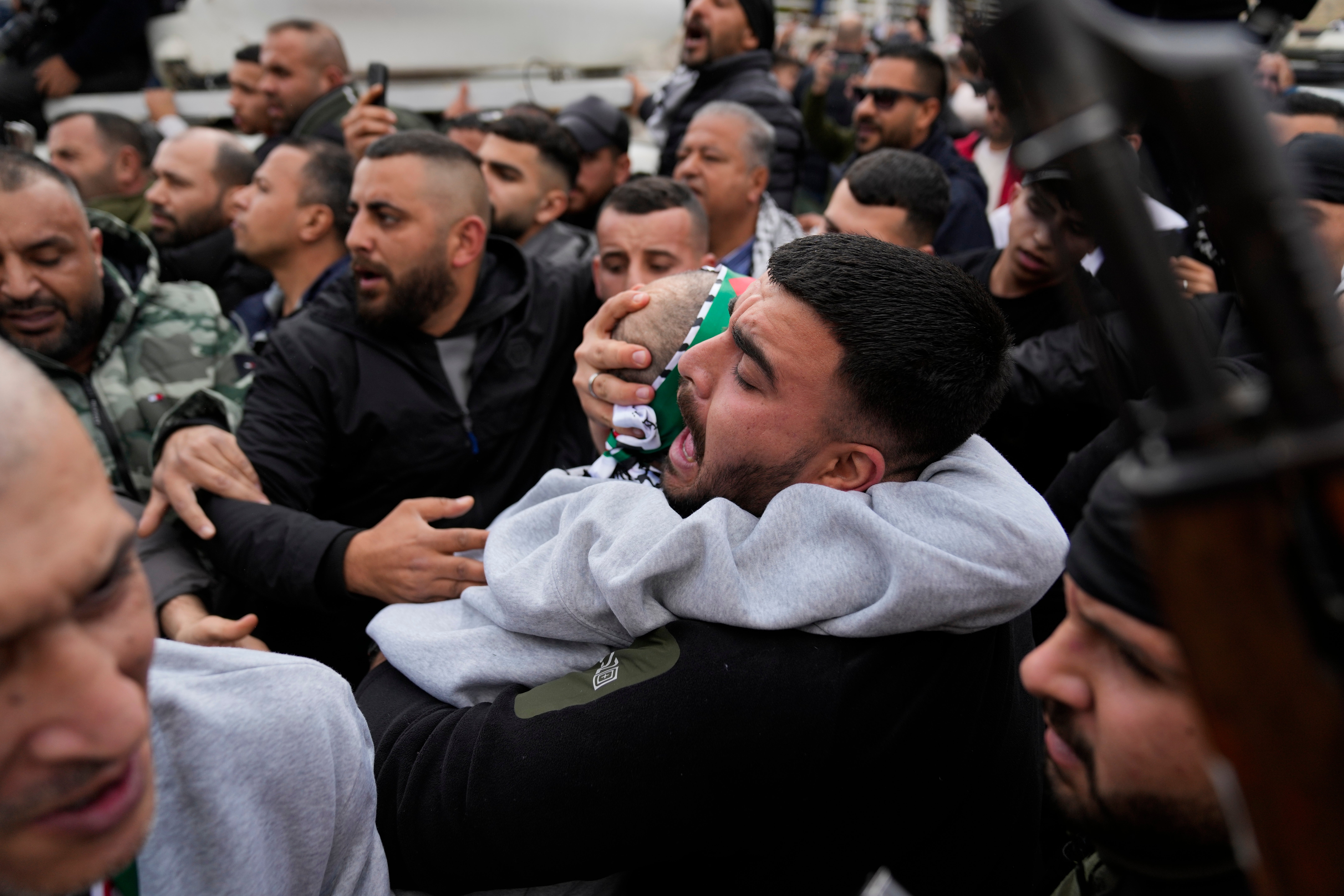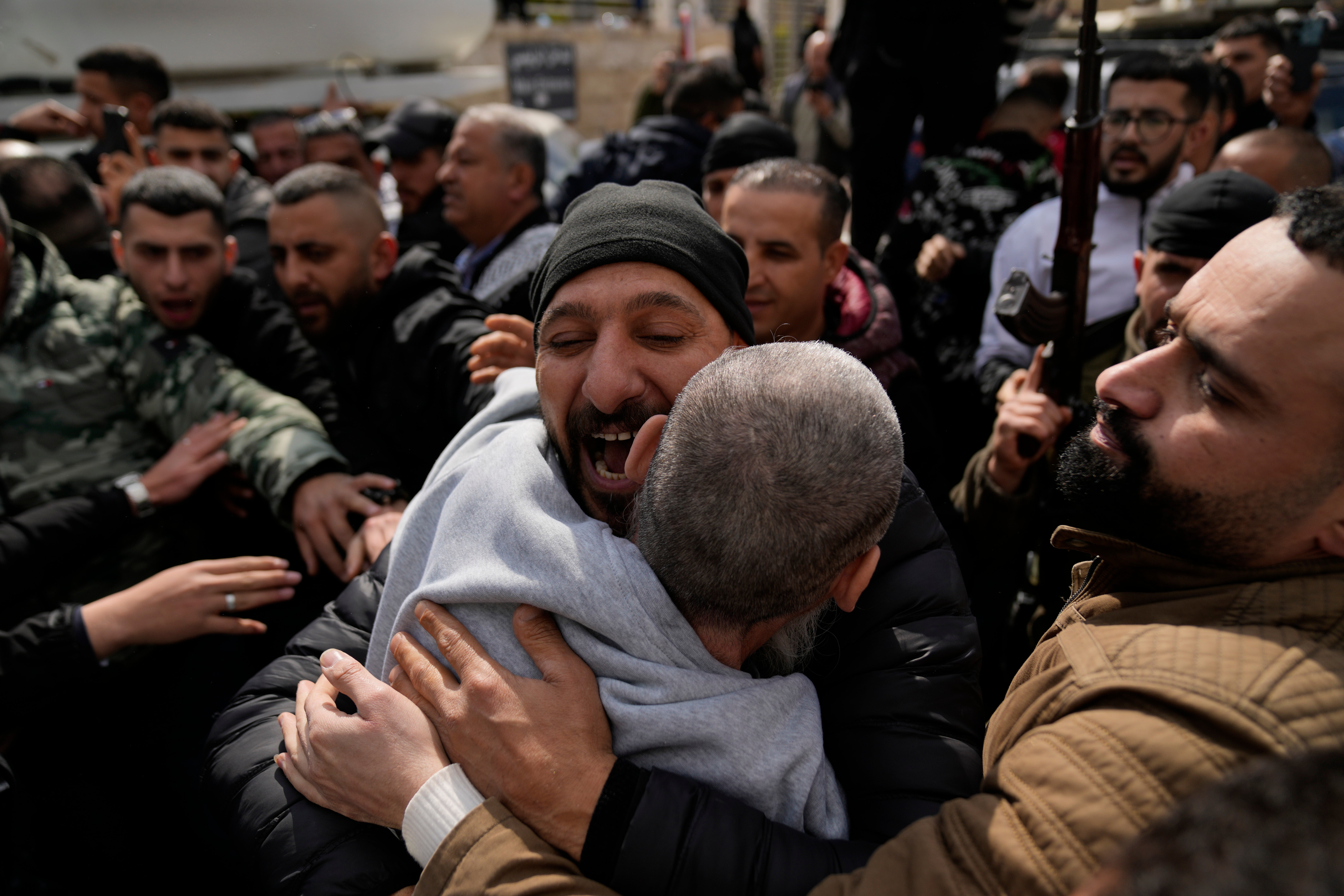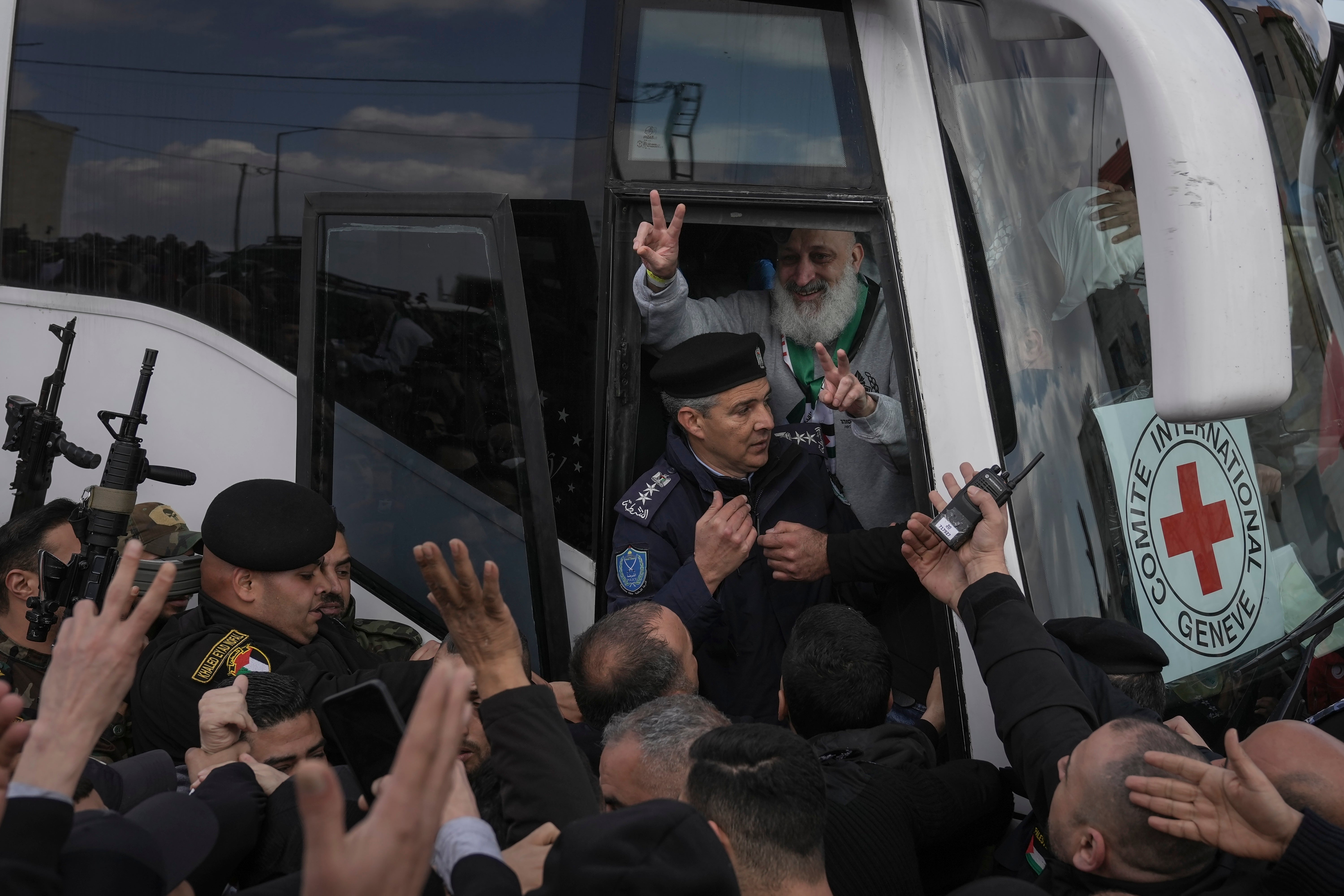
Israel on Saturday released a total of 183 Palestinian prisoners in exchange for three Israeli hostages held in Gaza as the ceasefire agreement between Israel and Hamas continued to gain traction after nearly two weeks.
In a sign of progress, Saturday’s release included for the first time some of the 1,000 detainees from Gaza that Israel has agreed to free during Phase 1 of the deal on condition that they did not participate in Hamas’ Oct. 7, 2023, attack that triggered the Israel-Hamas war.
Detained in Gaza on suspicion of militancy, the 111 Palestinians released Saturday have been held without trial since the day after the October 7 attack.

The remaining 72 Palestinians, all arrested from either the West Bank or Gaza before the war, served long sentences or life sentences for deadly attacks against Israelis. They are all men, ranging in age from 30 to 66.
The release of Palestinians from Gaza draws attention to Israel’s mass roundups of men in the enclave during the past 15 months of its military campaign against Hamas. Many were taken to Israel.
Images of Israeli forces rounding up Palestinians in Gaza — showing men stripped to their underwear, sitting or kneeling on the ground, with some bound and blindfolded — have sparked outrage and concern from the U.N. human rights body. The Israeli military says it arrests those suspected of involvement in Hamas and other militant groups.
In the occupied West Bank, excited crowds thronged the Red Cross bus carrying the Palestinians from Ofer prison near Ramallah. But the festivities were muted compared to previous weeks. Just 25 prisoners were set free into the West Bank, while another seven were being transferred to Egypt before deportation.
The rest were headed home to Gaza for the first time in months, or, in some cases, years, where celebrations awaited.

Here’s a look at some prominent Palestinian prisoners released since the ceasefire deal went into effect on Jan. 19:
Mohammed el-Halabi
The Palestinian manager of the Gaza branch of World Vision, a major Christian aid organization, was arrested in 2016 and accused of diverting tens of millions of dollars to Hamas in a high-profile case that drew criticism from rights groups. He was freed on Saturday.
Both el-Halabi, 47, and World Vision vigorously denied the allegations and independent investigations found no proof of wrongdoing. One independent audit found that el-Halabi had enforced internal controls and ordered employees to avoid anyone suspected of Hamas ties.
World Vision has also said that the accusations that el-Halabi transferred 60% of the charity’s annual budget for Gaza to Hamas could not be reconciled with its financial records.
Rights groups say el-Halabi was denied a fair and transparent trial, as he and World Vision had no chance to review the evidence against them, with all procedures shielded from the public and shrouded in unusual secrecy. U.N. experts say el-Halabi was questioned for 50 days without access to a lawyer. He was sentenced to 12 years in prison.
Israel has attributed the closed hearings to sensitive security information being relayed. Israeli courts typically hold closed hearings to protect the sources of their information.
His prolonged detention sent a chill through nongovernmental groups providing aid to Palestinians in Gaza. After el-Halabi’s arrest, World Vision suspended its activities in Gaza, where it it says its aid had benefited nearly 40,000 children affected by the crippling Israeli-Egyptian blockade on the enclave.

Shadi Amouri
Amouri, 44, from the northern West Bank city of Jenin, was arrested for his alleged role in manufacturing the powerful car bomb that detonated beside an Israeli bus packed with passengers on June 5, 2002, killing 17 Israelis in what became known as the Megiddo Junction suicide bombing.
The attack during the second intifada, or Palestinian uprising, between 2000 and 2005, took place in northern Israel. The Palestinian militant group Islamic Jihad claimed responsibility.
Amouri was sentenced to life in prison, plus 20 years. He was among those transferred to Egypt Saturday and released into exile.
“We wish to have felt the joy of his release here, on the land of Jenin refugee camp,” said Bassam Amouri, his brother. “But, thank God, what matters is that he is free of the suffering of prison.”
Ashraf Abu Srour
Abu Srour, 50, sentenced to life in prison over a 2000 attack that killed Israeli soldier Shahar Veckart, was also among those released Saturday into exile.
Hailing from Aida refugee camp in the West Bank city of Bethlehem, Abu Srour was detained in 2001 and convicted the next year over the shooting at Rachel’s Tomb, the traditional burial place of the wife of the biblical patriarch Jacob. During the second intifada, the shrine became a target of Palestinian militants protesting Israel’s claim to the holy site revered by Jews, Christians and Muslims alike.
Abu Srour belonged to the Al-Aqsa Martyrs’ Brigade — an armed group affiliated with Fatah, the secular political party that controls the Palestinian Authority.
Zakaria Zubeidi
Zakaria Zubeidi is a prominent former militant leader and theater director whose dramatic jailbreak in 2021 thrilled Palestinians across the Middle East and stunned the Israeli security establishment.
Zubeidi once led the Al-Aqsa Martyrs’ Brigade. After the second intifada in 2006, he co-founded a theater in his hometown of Jenin refugee camp, a hotbed of Palestinian militancy, to promote what he described as cultural resistance to Israel. Even today, the Freedom Theater puts on everything from Shakespeare to stand-up comedy to plays written by residents.
In 2019, after Zubeidi had already served years in prison for attacks in the early 2000s, Israel arrested him again over his alleged involvement in shooting attacks that targeted buses of Israeli settlers but caused no injuries.
Zubeidi, who was released Thursday into the West Bank, had been awaiting trial in prison. He denies the charges, saying that he gave up militancy to focus on his political activism after the intifada.
In 2021, he and five other prisoners tunneled out of a maximum-security prison in northern Israel, an escape that helped solidify Zubeidi’s image among Palestinians as a folk hero. All six were recaptured days later.
Mohammed Abu Warda
A Hamas militant during the second intifada, Abu Warda helped organize a series of suicide bombings that killed over 40 people and wounded more than a hundred others. Israel arrested him in 2002, and sentenced him to 48 terms of lifetime imprisonment, among the longest sentences it ever issued.
As a young student, Abu Warda joined Hamas at the start of the intifada following Israel’s killing of Yahya Ayyash, the militant group’s leading bomb maker, in 1996.
Palestinian authorities said at the time that Warda had helped to recruit suicide bombers — including his cousin, his cousin’s neighbor and a classmate at the Ramallah Teachers College — whose attacks targeting crowded civilian areas in Israeli cities killed scores of people in the early 2000s.
Warda was released and deported on Thursday.
Mohammed Aradeh, 42
An activist in Palestinian Islamic Jihad, Aradeh was sentenced to life in prison for a range of offenses going back to the second intifada. Some of the charges, according to the Israeli Prison Service, included planting an explosive device and attempting murder.
He was credited with plotting the extraordinary prison escape in 2021, when he and five other detainees, including Zubeidi, used spoons to tunnel out one of Israel’s most secure prisons. They remained at large for days before being caught.
From an impoverished and politically active family in Jenin, in the northern occupied West Bank, Aradeh has three brothers and a sister who have all spent years in Israeli prisons.
He was welcomed as a sort of cult hero in Ramallah on Jan. 25 as family, friends and fans swarmed him, some chanting “The freedom tunnel!” in reference to his jailbreak.
Mohammed Odeh, 52, Wael Qassim, 54, and Wissam Abbasi, 48
All three men hail from the neighborhood of Silwan, in east Jerusalem, and rose within the ranks of Hamas. Held responsible for a string of deadly attacks during the second intifada, the men were sentenced to multiple life sentences in 2002.
They were accused of plotting a suicide bombing at a crowded pool hall near Tel Aviv in 2002 that killed 15 people. Later that year, they were found to have orchestrated a bombing at Hebrew University that killed nine people, including five American students. Israel had described Odeh, who was working as a painter at the university at the time, as the kingpin in the attack.
All three were transferred to Egypt on Jan. 25. Their families live in Jerusalem and said they will join them in exile.
The Abu Hamid brothers
Three brothers from the prominent Abu Hamid family of the Al-Amari refugee camp in Ramallah — Nasser, 51, Mohammad, 44, and Sharif, 48 — were also deported to Egypt on Jan. 25. They had been sentenced to life in prison over deadly militant attacks against Israelis in 2002.
Their brother, a different Nasser Abu Hamid, was one of the founders of the Al-Aqsa Martyrs’ Brigade. He was also sentenced to life in prison for several deadly attacks. His 2022 death from lung cancer behind bars unleashed a wave of angry protests across the West Bank as Palestinian officials accused Israel of medical neglect.
The family has a long arc of Palestinian militancy. The mother, Latifa Abu Hamid, 72, now has three sons exiled, one still imprisoned, one who died in prison and one who was killed by Israeli forces. Their family house has been demolished at least three times by Israel, which defends such punitive home demolitions as a deterrent against future attacks.
Mohammad al-Tous, 67
Al-Tous had held the title of longest continuous Israeli imprisonment until his release last Saturday, Palestinian authorities said.
First arrested in 1985 while fighting Israeli forces along the Jordanian border, the activist in the Fatah party spent a total of 39 years behind bars. Originally from the West Bank city of Bethlehem, he was among the prisoners exiled on Jan. 25.







